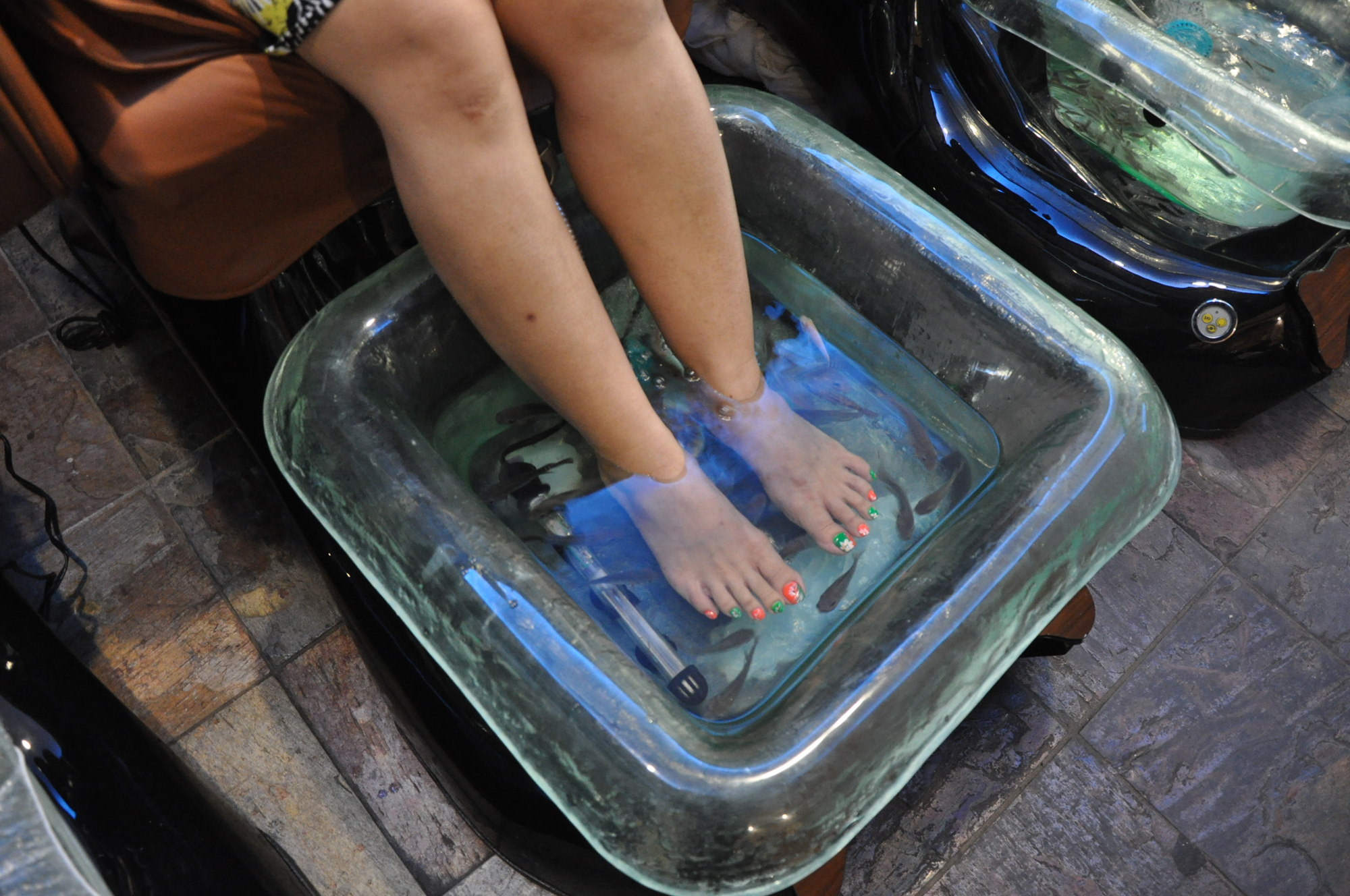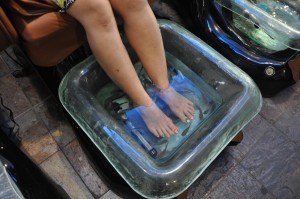WASHINGTON — Back in 2008, a new spa pedicure trend swept the nation: tiny fish eating dead skin off of customers’ feet. Now the Centers for Disease Control and Prevention is warning that the so-called “doctor fish” may carry bacteria that could cause serious infections.
Shortly after the fish pedicures began, public health agencies spoke out against t
he practice, prompting California, Florida and several other states to ban the pedicures outright.
On Wednesday the Centers for Disease Control and Prevention published a report by the Centre for Environment, Fisheries & Aquaculture Science in the United Kingdom, which studied the kinds of bacteria carried by the Garra rufa, or “doctor fish,” an inch-long silver carp native to Southeast Asia.
“To date there has been only limited information on the types of bacteria associated with these fish,” lead researcher David Verner-Jeffreys said. “Our study identified some of the species of bacteria associated with this fish species, including some that can cause infections in both fish and humans.”
It’s no secret that water provides a fertile breeding ground for all kinds of bacteria. Mix that with bacteria living on fish scales or in their waste and even the tiniest cut from an overzealous doctor fish, and the risk of infection is very real.
Doctor fish are generally imported to salons from Indonesia or Malaysia, which can make it difficult to control the quality of the fish breeding and environment.
Following a 2011 outbreak of strep bacteria in a shipment of the fish, the British government seized five containers from London’s Heathrow Airport to study what kinds of bacteria the fish were carrying.
“The [strep] strain we isolated typically only causes disease in fish,” Verner-Jeffreys said. “We then went on to look at other consignments of apparently healthy imported G. rufa and found some other species of bacteria that can cause disease in humans and fish.”
These bacteria included: Aeromonas, which causes wound infections and gastrointestinal problems in humans; Streptococcus agalactiae, which causes skin and soft tissue infections; and Mycobacteria, which the study reported has been directly responsible for skin infections in some pedicure clients in the U.K.
Furthermore, the researchers found that these bacteria were often multi-drug resistant and therefore difficult to cure.
“To date, there are only a limited number of reports of patients who might have been infected by this exposure route,” the report stated. “However, our study raises some concerns over the extent that these fish, or their transport water, might harbor potential zoonotic disease pathogens of clinical relevance.”
John Ho owns Yvonne’s Day Spa in Alexandria, Va., reportedly the first spa in the United States to offer the Fish-y-cure®. He gets a shipment of about 10,000 fish once a year from one of three suppliers in Malaysia, Singapore or China. Once they’re imported, he stores them in a warehouse.
“You have to keep them like a pet,” Ho said. “You buy a tank, the filtration system, all the chemicals to purify the water. The system is built to be similar to the natural environment.”
At Ho’s salon, customers sit in a massage chair with their feet in a specially designed bowl, covered by a plastic liner, which is filled with water and changed after every use. His staff also watches the fish closely to make sure they appear healthy.
“If you have a sick fish, you will know. They will give you a sign,” Ho said. “It will swim very slowly, might not be working, might drift off by itself. If we see that, we’ll take them out and put them into an isolation area.”
Yvonne Day Spa staffers also take precautions with clients, washing their feet and inspecting them for cuts before beginning the pedicure. If they find an open wound, Ho said, they won’t do the treatment.
They don’t, however, ask clients about any immune system issues. CDC has stated that anyone with an immunodeficiency should stay away from fish pedicures.
“If they have a low immune system, they should have told us,” he said. “We don’t ask anything about medical history. It’s not our responsibility to know.”
Ho also said that in the four years he’s been offering the pedicures, only one or two fish have become sick and no clients have accused his salon of causing an infection.
“It should be emphasized that neither us nor the [British] Health Protection Agency are advising that the practice should be banned,” Verner-Jeffreys said. “Any risks may be reduced by use of disease-free fish reared in controlled facilities under high standards of husbandry and welfare.”


